|
6/10/2006
June 19, 2006: "Valiant Shield" and the Bunker
UPDATE: AF.MIL Hits Related to Valiant ShieldI have no idea what this means, if anything, but lots of U.S. Air Force users are searching Google for information on Valiant Shield; what we think is a U.S. Naval exrercise... - - - - - What do the largest U.S. Naval exercise in the Pacific since the Vietnam War and the largest continuity of government drill ever held by the United States Government have in common? June 19, 2006. Probably nothing. Maybe something: Carriers Ready for War GamesThe Navy will make a point of demonstrating its carrier strength in the Pacific this summer.
Three aircraft carriers will head to Guam for military exercises later this month. One will later take part in upcoming Rim of the Pacific war games off Hawai'i, and two carriers will train in the western Pacific in August, the Navy said.
Officials yesterday said the carriers Reagan, Lincoln and Kitty Hawk will participate in the Valiant Shield exercise from about June 19 to 23. The Reagan and Lincoln are expected to make port calls at Pearl Harbor. Valient Shield - Largest Military Exercise in Pacific Since Vietnam War... the "Valiant Shield" U.S. military exercise in June that will be held near Guam. Three aircraft carriers are expected to take part in exercises that month in the biggest carrier operation in the Pacific since the Vietnam War. Back to the BunkerOn Monday, June 19, about 4,000 government workers representing more than 50 federal agencies from the State Department to the Commodity Futures Trading Commission will say goodbye to their families and set off for dozens of classified emergency facilities stretching from the Maryland and Virginia suburbs to the foothills of the Alleghenies. They will take to the bunkers in an "evacuation" that my sources describe as the largest "continuity of government" exercise ever conducted, a drill intended to prepare the U.S. government for an event even more catastrophic than the Sept. 11, 2001, attacks. Again, probably nothing...
posted by Kevin at 4:25 PM
Garden Preparation
Becky and I are converting some of the "house paddock" into garden space. We needed a nontoxic way of taking out the kikuyu grass, temporarily, in order to get some raised beds and walkways in. For the uninitiated, kikuyu grass is a fast growing grass that is common in New Zealand. If I told you just how fast it grows in this environment, you probably wouldn't believe me. I've watched what it does from day-to-day and I don't believe it. The good news is that with thorough composting, we can repurpose the kikuyu into a nice mulch. I've got some of it well rotted and it makes a beautiful compost. Becky's dad gave us a large roll of this black poly stuff. Shade really knocks kikuyu back. We're going to keep this on for a while and see how it goes. The amount of rainfall here is surreal. It just tips out of the sky, sometimes for days. The gumboot picture below will give you an idea of what happens to the soil here in the winter. Obviously, raised beds aren't optional. We have made a tentative decision to build the raised beds out of wine bottles. The raised bed material had to meet three criteria: 1) Free 2) Non toxic 3) Won't break down I think we will be able to attain a bed height that will be barely adequate for many of the crops we want to grow. I wish we had piles of river bottom rocks close by, but alas, we don't. Note: We don't drink that much wine, so we'll be scavenging up most of the bottles from here and there.  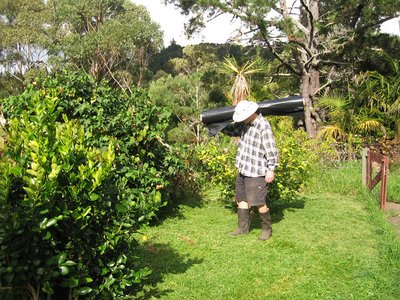 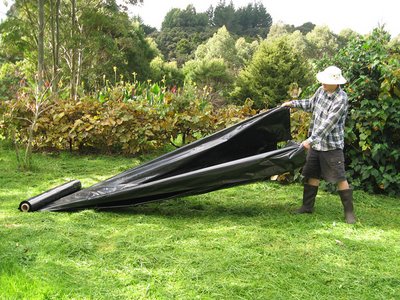 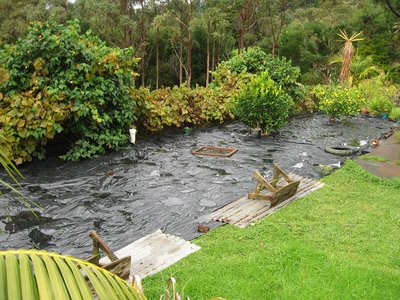 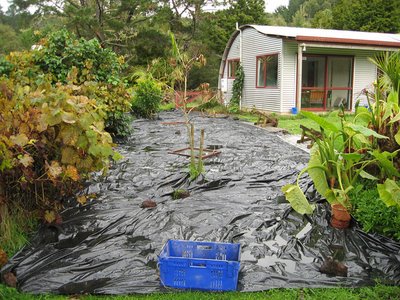 posted by Kevin at 3:39 AM
posted by Kevin at 3:39 AM
6/9/2006
'Mind Over Matter' No Longer Science Fiction
:.
I wonder what They have down in the crypt: Sitting stone still under a skull cap fitted with a couple dozen electrodes, American scientist Peter Brunner stares at a laptop computer. Without so much as moving a nostril hair, he suddenly begins to compose a message -- letter by letter -- on a giant screen overhead.
"B-O-N-J-O-U-R" he writes with the power of his mind, much to the amazement of the largely French audience of scientists and curious onlookers gathered at the four-day European Research and Innovation Exhibition in Paris, which opened Thursday.
Brunner and two colleagues from the state-financed Wadsworth Center in Albany, New York were demonstrating a "brain computer interface (BCI)," an astounding technology which digitalizes brain signals emitted as electrical impulses -- picked up by the electrodes -- to convey intent.
posted by Kevin at 11:54 PM
Cryptogon Reader Signs Up With Blue Host!
Cryptogon receives $65! Thanks machinegod.us! And he has posted a Blue Host signup link on his site that credits Cryptogon. I immediately used this commission payment to buy the large NightStar LED flashlight, via Deconsumption's Cata'blog. Besides food, the things Becky and I are buying now fall mainly into three categories: 1) Tools that will last a very long time
2) Inexpensive tools that speed up the building of our permaculture farm
3) Plants, animals, seeds That NightStar light is a Category 1 purchase. Thanks to Steve at Deconsumption for providing such consistently great content! Related: Hosting With Blue Host
posted by Kevin at 4:27 PM
The Monkey Chow Diaries
:.
Although this is offtopic, it must be posted: I'm tired of cooking. I hate scrubbing pots and pans. I've wasted too much time in the checkout line. It's time to eat chow.
posted by Kevin at 4:15 PM
The Al-Zarqawi Circus
:.
I couldn't bring myself to take seriously any of the nonsense surrounding this al-Zarqawi circus. It's a bit like when the media is consumed by the kidnapping of a blond woman. Or, in other news, Michael Jackson diddles _______ <--- fill in the blank. Al-Zarqawi, Satan's Lieutenant, Killed by the League of Justice, or whatever the headlines read... Tell me another one. Weirdly, Jeff hasn't dealt with it yet. I wonder if the entire thing is too stupid for him to bother with... Sploid has a roundup, if you're interested.
posted by Kevin at 3:54 PM
MIT's Super Battery
:.
They turned to the capacitor, which was invented nearly 300 years ago. Schindall explains, "We made the connection that perhaps we could take an old product, a capacitor, and use a new technology, nanotechnology, to make that old product in a new way."
Rechargable and disposable batteries use a chemical reaction to produce energy. "That's an effective way to store a large amount of energy," he says, "but the problem is that after many charges and discharges ... the battery loses capacity to the point where the user has to discard it."
But capacitors contain energy as an electric field of charged particles created by two metal electrodes. Capacitors charge faster and last longer than normal batteries. The problem is that storage capacity is proportional to the surface area of the battery's electrodes, so even today's most powerful capacitors hold 25 times less energy than similarly sized standard chemical batteries.
The researchers solved this by covering the electrodes with millions of tiny filaments called nanotubes. Each nanotube is 30,000 times thinner than a human hair. Similar to how a thick, fuzzy bath towel soaks up more water than a thin, flat bed sheet, the nanotube filaments on increase the surface area of the electrodes and allow the capacitor to store more energy. Schindall says this combines the strength of today's batteries with the longevity and speed of capacitors.
"It could be recharged many, many times perhaps hundreds of thousands of times, and ... it could be recharged very quickly, just in a matter of seconds rather than a matter of hours," he says.
posted by Kevin at 3:44 PM
Reader Email: Money Talks and Bullsh*t Goes Into My Compost Heap
I thought I'd open this up to everyone, in case it's useful. Robert wrote: Subject: Comments on Gold/Stocks?
I enjoy the financial commentary on your blog, and while it may not be the central focus, I am curious to hear your thoughts on the current trends in gold and stocks. I am a novice at best when it comes to economics and market analysis, but it would stand to reason that gold would be trending upwards as stocks decline and investors look for safer investments. At the moment both gold and stocks are trending down. Perhaps there really is no logic left in economic decisions? I wrote back: Hi Robert,
How the system is up at all right now is a COMPLETE mystery to me. Specifically, I don't understand how the U.S. dollar is still viable, with the national debt closing in on $8.4 trillion... It's probably sheer voodoo and black ops at this point.
Don't get me wrong, I'm glad that it's up, because it would be difficult for my wife and I to establish our permaculture farm with the global economy in a state of collapse. After all, the same economic system that produces tanks, rockets and bombs also produces chicken wire.
We need chicken wire.
I think that the rest of the world will continue to prop up the U.S. for as long as possible, simply because the rest of the world has gotten used to exchanging its goods and services for funny money. How and why that state of affairs came to be is a long and complicated story that doesn't even matter anymore; not at this late stage of the game. But once it's clear that the scam is unraveling, the U.S. will just print money at will. Paying off the massive debt will then simply be a matter of zapping X trillion nearly worthless U.S. dollars into the central banks of America's creditors.
The global economic system could, should and probably would collapse at that point.
When will it happen?
Who knows? Certainly not me. Maybe it will never happen and the U.S. national debt will be allowed to go to $50 trillion or $100 trillion and it will be new Hummers and iPods for all!
Or... Maybe the collapse is happening now, in slow motion. Look at the growing list of states that are divesting away from the dollar. Russia is the latest and most influential state to do this. Why is that happening? Because the U.S. has a bright future ahead?
The U.S. dollar works because people pretend that it's real, and nuclear weapons, thirteen carrier strike groups, and millions of soldiers make it so. As more and more major actors wake up to the fact that the dollar represents a total joke, and that the joke isn't funny anymore... Watch out.
Over the last few decades, the most powerful states in the world have lashed themselves to the mast of a sinking ship. It's that simple. And I'm not being cavalier about it! I don't feel financially secure because my money is out of the U.S. I firmly believe that, when the U.S. goes down, it will take the rest of the global economy down with it.
I now view security in terms of self and small group sufficiency. My wife and I are using the assets we have at our disposal to build viable biological systems that have a chance of sustaining us as we head into the collapse of the present economic system. As for investments? We paid cash for our land and we're investing what we have left in tools, creatures, seeds and piles of biomass to jumpstart our gardening efforts. Dividends and profits from these investments literally DO grow on trees!
If you're interested, there was some talk about metals in the forum. But... If it has quotes that are updated in real-time, chances are, it won't be useful for much when the sh*t hits the fan. Rather, I would think in terms of community, clean water, shelter and viable, small scale food production systems, in that order.
Best,
Kevin
posted by Kevin at 4:26 AM
RUSSIA SHIFTS FOREX RESERVES OUT OF USD
:.
You don't need to be a weatherman to know which way the wind blows: Russia became the latest country to shift a chunk of its central bank reserves out of the dollar, further eroding the standing of the greenback as the world's de facto reserve currency.
Sergei Ignatyev, chairman of the central bank, said 50 per cent of its forex reserves were now held in dollars, with 40 per cent in euros and the remainder in sterling. Previously it was believed that just 25-30 per cent of the reserves were in euros, with virtually all the remainder in dollars.
Moscow's reserves have grown rapidly in tandem with high oil and gas prices. The central bank now boasts the world's fourth-largest reserves, after China, Japan and South Korea, with its gold and forex holdings rising by 36 per cent so far this year to $247bn.
The move ties in with increasing signs that cash-laden Middle Eastern oil exporters are also looking to diversify reserves out of the dollar, following hints from the United Arab Emirates, Kuwait and Qatar.
"This is a bearish development for the dollar," said Chris Turner, head of currency research at ING Financial Markets. "It reminds us that global surpluses are accumulating to the oil exporters, and Russia is telling us that an increasingly lower proportion of these reserves will be held in dollars. This suggests there is a trend shift away from the dollar."
posted by Kevin at 2:25 AM
Russian Oil Exchange is Just a Roulette Wheel... For Now
:.
There is no way to take delivery of oil, the underlying comidity! HAHA! At the moment, this is just a racket to swindle exchange fees out of punters: Although the Urals prices are quoted in dollars, the contracts are settled in rubles according to the Central Bank's exchange rate. Investors cannot get delivery of any physical oil through the exchange -- all contracts are cancelled and settled in cash.
"Oil companies are not involved in this -- it's just a financial instrument," said Valery Nesterov, oil analyst at Troika Dialog. Nesterov said the contracts would provide "more opportunities to ensure market stability and hedge against price fluctuations."
In the future, the exchange will begin trading refined oil products, according to an RTS spokeswoman.
posted by Kevin at 2:11 AM
Machine Makes Building Materials Out of Waste Straw
:.
This is the best news I've seen in months: Developed mainly by Ward in his backyard shop and relocated to big shops in Talent last year, Strawjet Inc. produces a machine that gleans waste straw from fields, weaves it into cables, then, using a clay-cement material, binds the cables into building materials, such as blocks and beams.
posted by Kevin at 1:47 AM
6/8/2006
Rig Exodus Impacts Production In Gulf Of Mexico
:.
Say what?! Just days into this year's hurricane season, Morgan Stanley forecasted that the migration of oil rigs to the Middle East for longer-term contracts could hurt production in the Gulf of Mexico, which is still recovering from last year's storms.
Analyst Ole Slorer said GlobalSantaFe's announcement that it was sending four of its jackup rigs to Saudi Arabia, in a deal with Saudi Aramco, is part of an ongoing exodus to the Middle East that could cut shelf production in the Gulf of Mexico by as much as 20% over the next 18 months.
These kinds of announcements, Slorer told investors in a research note Monday, tighten the supply of rigs left to address the spot market in the Gulf of Mexico and could have "severe implications" on medium term natural gas production capacity.
posted by Kevin at 4:39 AM
6/7/2006
Why Are Americans so Lukewarm on Solar Hot Water?
:.
Becky and I used to live in a place where we would be fined for using a clothes line to dry our wash. Some of you will think I'm exaggerating, but it's true. I wonder if the pigs will be coming around to fine people for drying their laundry in the sun when the brown outs become routine??? Cheap and effective enough to make economic sense to middle-class urbanites, Huang's basic models start at around 1,500 yuan ($190), although for a luxury home this could rise to 18,000 yuan ($2,250).
With technology so efficient they can work at temperatures well below freezing and under cloudy or smog-choked skies, they soon pay for themselves, he says.
posted by Kevin at 4:52 AM
6/6/2006
Special Forces to Use Strap-On 'Stealth Wings'
:.
When will Cheney have teleportation capabilities? Elite special forces troops being dropped behind enemy lines on covert missions are to ditch their traditional parachutes in favour of strap-on stealth wings.
The lightweight carbon fibre mono-wings will allow them to jump from high altitudes and then glide 120 miles or more before landing - making them almost impossible to spot, as their aircraft can avoid flying anywhere near the target.
posted by Kevin at 3:45 PM
6/5/2006
45% of Americans Doubt 9/11 Story
:.
I don't know which is worse, that roughly half don't believe the story, or that the other half does believe it??? The credibility of Washington leaders is now so critically eroded that one of every two Americans would now support an international tribunal investigating the actions of the U.S. government.
posted by Kevin at 5:02 PM
Wal-Mart's Data Center Remains Mystery
:.
What do you expect from a company that operates dungeons? Behind a fence topped with razor wire just off U.S. Highway 71 is a bunker of a building that Wal-Mart considers so secret that it won't even let the county assessor inside without a nondisclosure agreement.
The 125,000-square-foot building, tucked behind a new Wal-Mart Supercenter, is only a stone's throw from the Arkansas line and about 15 miles from corporate headquarters in Bentonville, Ark.
There is nothing about the building to give even a hint that Wal-Mart owns it. Despite the glimpses through the fence of manicured grass and carefully placed trees, the overall impression is that this is a secure site that could withstand just about anything. Earth is packed against the sides. The green roof - meant, perhaps, to blend into the surrounding Ozarks hills - bristles with dish antennas. On one of the heavy steel gates at the guardhouse is a notice that visitors must use the intercom for assistance.
What the building houses is a mystery.Research Credit: MM
posted by Kevin at 4:28 PM
6/4/2006
Back to the Bunker
:.
More chatter about June: On Monday, June 19, about 4,000 government workers representing more than 50 federal agencies from the State Department to the Commodity Futures Trading Commission will say goodbye to their families and set off for dozens of classified emergency facilities stretching from the Maryland and Virginia suburbs to the foothills of the Alleghenies. They will take to the bunkers in an "evacuation" that my sources describe as the largest "continuity of government" exercise ever conducted, a drill intended to prepare the U.S. government for an event even more catastrophic than the Sept. 11, 2001, attacks.
The exercise is the latest manifestation of an obsession with government survival that has been a hallmark of the Bush administration since 9/11, a focus of enormous and often absurd time, money and effort that has come to echo the worst follies of the Cold War. The vast secret operation has updated the duck-and-cover scenarios of the 1950s with state-of-the-art technology -- alerts and updates delivered by pager and PDA, wireless priority service, video teleconferencing, remote backups -- to ensure that "essential" government functions continue undisrupted should a terrorist's nuclear bomb go off in downtown Washington.
posted by Kevin at 3:11 PM
Outing to the Top of New Zealand
We went on a family outing to the farthest northern tip of New Zealand. I thought I'd share a couple of images to lighten things up a bit. Houhora Harbor: Cape Reinga: Cape Reinga:In Maori tradition, Cape Reinga is where the souls of the dead leap from Aotearoa and return to Hawaiki. It's an amazing spot: 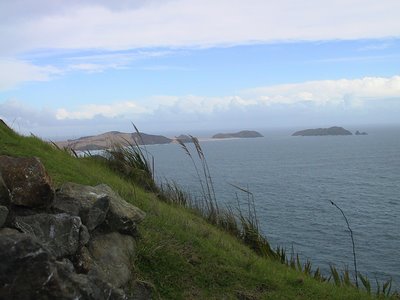   Bonus: 2006 Houhora Big Game and Sports Fishing Club's Ultimate Challenge Bonus: 2006 Houhora Big Game and Sports Fishing Club's Ultimate ChallengeOn our way home, we checked in to see if we could meet up with Tony, Becky's cousin, who was competing. If it walked on all fours, swam in the ocean or flew through the air, teams of men hunted or angled for it. The team with the heaviest haul is the winner. Now, who gets to butcher all of those carcasses? 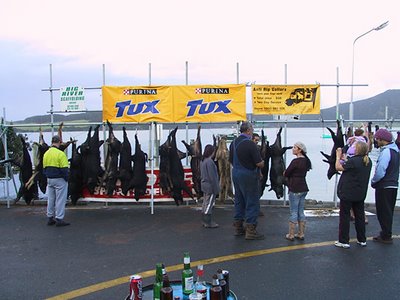 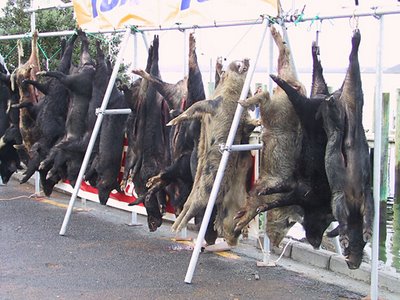  Note: Becky wants readers to be aware that all of the creatures killed in this event are: pests that threaten New Zealand's ecology; and/or species that are traditionally hunted/fished for food.
posted by Kevin at 3:56 AM
|
:. Reading
 Fatal
Harvest: The Tragedy of Industrial Agriculture by Andrew Kimbrell
Readers will come to see
that industrial food production is indeed a "fatal harvest"
- fatal to consumers, as pesticide residues and new disease vectors
such as E. coli and "mad cow disease" find their way
into our food supply; fatal to our landscapes, as chemical runoff
from factory farms poison our rivers and groundwater; fatal to
genetic diversity, as farmers rely increasingly on high-yield
monocultures and genetically engineered crops; and fatal to our
farm communities, which are wiped out by huge corporate
farms. Fatal
Harvest: The Tragedy of Industrial Agriculture by Andrew Kimbrell
Readers will come to see
that industrial food production is indeed a "fatal harvest"
- fatal to consumers, as pesticide residues and new disease vectors
such as E. coli and "mad cow disease" find their way
into our food supply; fatal to our landscapes, as chemical runoff
from factory farms poison our rivers and groundwater; fatal to
genetic diversity, as farmers rely increasingly on high-yield
monocultures and genetically engineered crops; and fatal to our
farm communities, which are wiped out by huge corporate
farms.
 Friendly
Fascism: The New Face of Power in America by Bertram Myron Gross
This is a relatively
short but extremely cogent and well-argued treatise on the rise
of a form of fascistic thought and social politics in late 20th
century America. Author Bertram Gross' thesis is quite straightforward;
the power elite that comprises the corporate, governmental and
military superstructure of the country is increasingly inclined
to employ every element in their formidable arsenal of 'friendly
persuasion' to win the hearts and minds of ordinary Americans
through what Gross refers to as friendly fascism. Friendly
Fascism: The New Face of Power in America by Bertram Myron Gross
This is a relatively
short but extremely cogent and well-argued treatise on the rise
of a form of fascistic thought and social politics in late 20th
century America. Author Bertram Gross' thesis is quite straightforward;
the power elite that comprises the corporate, governmental and
military superstructure of the country is increasingly inclined
to employ every element in their formidable arsenal of 'friendly
persuasion' to win the hearts and minds of ordinary Americans
through what Gross refers to as friendly fascism.
 The
Good Life The
Good Life
by Scott and Helen Nearing Helen
and Scott Nearing are the great-grandparents of the back-to-the-land
movement, having abandoned the city in 1932 for a rural life based
on self-reliance, good health, and a minimum of cash...Fascinating,
timely, and wholly useful, a mix of the Nearings' challenging
philosophy and expert counsel on practical skills.
 Silent
Theft: The Private Plunder of Our Common Wealth by David Bollierd
In Silent Theft, David Bollier
argues that a great untold story of our time is the staggering
privatization and abuse of our common wealth. Corporations are
engaged in a relentless plunder of dozens of resources that we
collectively own—publicly funded medical breakthroughs,
software innovation, the airwaves, the public domain of creative
works, and even the DNA of plants, animals and humans. Too often,
however, our government turns a blind eye—or sometimes helps
give away our assets. Amazingly,
the silent theft of our shared wealth has gone largely unnoticed
because we have lost our ability to see the commons. Silent
Theft: The Private Plunder of Our Common Wealth by David Bollierd
In Silent Theft, David Bollier
argues that a great untold story of our time is the staggering
privatization and abuse of our common wealth. Corporations are
engaged in a relentless plunder of dozens of resources that we
collectively own—publicly funded medical breakthroughs,
software innovation, the airwaves, the public domain of creative
works, and even the DNA of plants, animals and humans. Too often,
however, our government turns a blind eye—or sometimes helps
give away our assets. Amazingly,
the silent theft of our shared wealth has gone largely unnoticed
because we have lost our ability to see the commons.
 The
Self-Sufficient Life and How to Live It: The Complete Back-To-Basics
Guide by John Seymour The
Self Sufficient Life and How to Live It is the only book that
teaches all the skills needed to live independently in harmony
with the land harnessing natural forms of energy, raising crops
and keeping livestock, preserving foodstuffs, making beer and
wine, basketry, carpentry, weaving, and much more. The
Self-Sufficient Life and How to Live It: The Complete Back-To-Basics
Guide by John Seymour The
Self Sufficient Life and How to Live It is the only book that
teaches all the skills needed to live independently in harmony
with the land harnessing natural forms of energy, raising crops
and keeping livestock, preserving foodstuffs, making beer and
wine, basketry, carpentry, weaving, and much more.
 When
Corporations Rule the World by David C. Korten
When Corporations
Rule the World explains how economic globalization has concentrated
the power to govern in global corporations and financial markets
and detached them from accountability to the human interest. It
documents the devastating human and environmental consequences
of the successful efforts of these corporations to reconstruct
values and institutions everywhere on the planet to serve their
own narrow ends. When
Corporations Rule the World by David C. Korten
When Corporations
Rule the World explains how economic globalization has concentrated
the power to govern in global corporations and financial markets
and detached them from accountability to the human interest. It
documents the devastating human and environmental consequences
of the successful efforts of these corporations to reconstruct
values and institutions everywhere on the planet to serve their
own narrow ends.
 The
New Organic Grower: A Master's Manual of Tools and Techniques
for the Home and Market Gardener
This expansion
of a now-classic guide originally published in 1989 is intended
for the serious gardener or small-scale market farmer. It describes
practical and sustainable ways of growing superb organic vegetables,
with detailed coverage of scale and capital, marketing, livestock,
the winter garden, soil fertility, weeds, and many other
topics. The
New Organic Grower: A Master's Manual of Tools and Techniques
for the Home and Market Gardener
This expansion
of a now-classic guide originally published in 1989 is intended
for the serious gardener or small-scale market farmer. It describes
practical and sustainable ways of growing superb organic vegetables,
with detailed coverage of scale and capital, marketing, livestock,
the winter garden, soil fertility, weeds, and many other
topics.
|